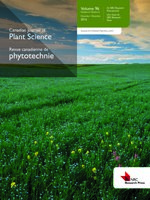Wan, S., Goto, K., Mottiar, Y., Staebler, J. M., Johnson, A. M., Voronova, A., Blais, D. R., Zaidi, M. A. and Altosaar, I. 2012. Bacterial nitrous oxide reductase expressed in transgenic plants: Evidence for sufficient anaerobicity to permit activity. Can. J. Plant Sci. 92: 1283-1294. Soil nitrogen enrichment practices enhance crop yields but greatly exacerbate the production and release of nitrous oxide (N2O), a potent greenhouse gas. The conversion of N2O to dinitrogen (N2) in soil denitrifiers is normally driven by the anaerobic enzyme nitrous oxide reductase (N2OR). Since this step is often limited in fertilised soils, we have transferred this unique microbial biocatalyst from the soil bacterium Pseudomonas stutzeri to transgenic Nicotiana tabacum plants. Our results confirm that engineered plants expressing the N2OR structural gene nosZ are capable of producing functional reductase enzyme without the involvement of the native accessory gene products. Since bacterial N2OR normally exists in the anaerobic environment of the soil bacterium's periplasmic space, this novel in planta activity suggests that plant cells can provide a similar hypoxic refuge for anaerobic enzyme activity. Genetically engineered crops containing N2OR could have considerable potential in the phytoremediation of atmospheric N2O.
How to translate text using browser tools
1 November 2012
Bacterial nitrous oxide reductase expressed in transgenic plants: Evidence for sufficient anaerobicity to permit activity
Shen Wan,
Kagami Goto,
Yaseen Mottiar,
Julianne M. Staebler,
Amanda M. Johnson,
Anastassia Voronova,
David R. Blais,
Mohsin A. Zaidi,
Illimar Altosaar
ACCESS THE FULL ARTICLE
It is not available for individual sale.
This article is only available to subscribers.
It is not available for individual sale.
It is not available for individual sale.
gaz à effet de serre
gène nosZ
greenhouse gas
nitrous oxide
nitrous oxide reductase
nosZ gene
oxyde nitreux





